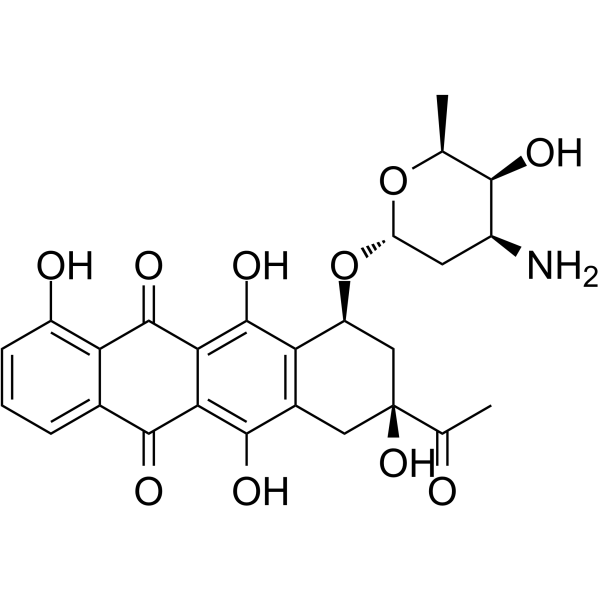 To enhance service speed and avoid tariff delays, we've opened a US warehouse. All US orders ship directly from our US facility.
To enhance service speed and avoid tariff delays, we've opened a US warehouse. All US orders ship directly from our US facility.
| Cat. No. | Product Name | Field of Application | Chemical Structure |
|---|---|---|---|
| DC8113 | Carubicin Featured |
Carubicin is an anthracycline antineoplastic antibiotic isolated from the bacterium Actinomadura carminata.
More description
|

|
| DC73087 | WZY-321 |
WZY-321 a small molecule glioma cell apoptosis inducer, binds to XAF1 3-UTR and decreases XAF1 (X-linked inhibitor of apoptosis-associated factor 1) mRNA levels.
More description
|

|
| DC73086 | Tpz-1 |
Tpz-1 is a unique cytotoxic compound that elicits potent and selective programmed cell death in human blood, breast, colon, and cervical cancer cell lines, interferes with components of signaling pathways and the cytoskeleton that are important to cell sh
More description
|

|
| DC73085 | ANP0903 |
ANP0903 is an analog of HIV-1 protease inhibitor darunavir, induces cytotoxicity in hepatocellular carcinoma cell lines, triggers apoptosis by enhancing ER stress.
More description
|

|
| DC10361 | Iberin Featured |
Iberin, a sulfoxide analogue of sulforaphane, is a naturally occurring member of isothiocyanate family. It inhibits cell survival with an IC50 of 2.3 μM in HL60 cell.
More description
|

|
| DC3156 | Elesclomol (STA-4783) Featured |
Elesclomol (STA-4783) is a novel potent oxidative stress inducer that illicits pro-apoptosis events among tumor cells..
More description
|

|
| DC2066 | Apoptosis Activator 2 Featured |
Apoptosis Activator 2 activates caspases in a cytochrome c-dependent manner and induces apoptosis in tumor cells.
More description
|

|
| DC71653 | BTR-1 |
BTR-1 induces cytotoxicity in a time- and concentration-dependent manner on leukemia cell line CEM. BTR-1 affects DNA replication by inducing a block at S phase and leads to activation of apoptosis to induce cell death.
More description
|

|
| DC70904 | WEHI-7326 |
WEHI-7326 (WEHI 7326) is a specifi mitotic inhibitor and potential anticancer agent, causes cell cycle arrest in G2/M, cell death in vitro (MDA-MB-231 IC50=24.4 nM), and displays efficacious anti-tumor activity in vivo.WEHI-7326 induces cell death in a broad range of cancer cell lines, including taxane-resistant cells, and inhibits growth of human colon, brain, lung, prostate and breast tumors in mice xenografts.WEHI-7326 exceeded potency of myoseverin B by almost ten-fold, did not show any significant cytotoxic activity in vitro (IC50>40 uM) in HepG2 cells.WEHI-7326 prolongs survival in mouse models of high-risk neuroblastoma and leads to complete tumor regression when used in combination with standard-of-care relapse therapies.
More description
|

|
| DC70564 | Leusin-1 |
Leusin-1 (Leukemia specific inhibitor 1) is a cell cycle phase specific inhibitor that specifically arrest leukemia cells during G2-phase and triggers an apoptotic cell death (CCRF-CEM IC50= 2.66 uM and TOM1 IC50= 0.877 uM).Leusin-1 showed specificity towards acute lymphoblastic leukemia cells than other types of leukemias, non-bloodborne cancers, or normal cells.Leusin-1 also arrested cells with lower levels of p-H3 (present only in M-phase) and increased levels of Cyclin A (levels peak in G2-phase).Leusin-1 does not target tubulin, Leusin-1 inhibited colony formation similar to Taxol.
More description
|

|
| DC28336 | Se-Methylselenocysteine Featured |
Se-Methylselenocysteine, a precursor of Methylselenol, has potent cancer chemopreventive activity and anti-oxidant activity. Se-Methylselenocysteine is orally bioavailable, and induces apoptosis.
More description
|

|
| DC28574 | Minerval Featured |
Minerval (2-Hydroxyoleic acid) is a synthetic oleic acid (OA) derivative that binds to the plasma membrane and alters lipid organization. Minerval has anti-tumor effect.
More description
|

|
| DC44806 | Sodium Fluoride |
Sodium fluoride (NaF) induces apoptosis and autophagy via the endoplasmic reticulum (ER) stress pathway in MC3T3-E1 osteoblastic cells.
More description
|

|
| DC28946 | DB1976 hydrochloride |
DB1976 hydrochloride is a selenophene analog of DB270 and a potent and cell-permeable fully efficacious PU.1 inhibitor. DB1976 hydrochloride potently inhibits PU.1 binding (IC50 of 10 nM) and strongly inhibits the PU.1/DNA complex (with high DB1976-λB affinity, KD of 12 nM) in vitro. DB1976 hydrochloride has apoptosis-inducing effect.
More description
|

|
| DC28945 | DB1976 |
DB1976 is a selenophene analog of DB270 and a potent and cell-permeable fully efficacious PU.1 inhibitor. DB1976 potently inhibits PU.1 binding (IC50 of 10 nM) and strongly inhibits the PU.1/DNA complex (with high DB1976-λB affinity, KD of 12 nM) in vitro. DB1976 has apoptosis-inducing effect.
More description
|

|
| DC28190 | β-Elemene |
β-Elemene ((-)-β-Elemene; Levo-β-elemene) is isolated from natural plant Curcuma wenyujin with an antitumor activity. β-Elemene can induce cell apoptosis.
More description
|

|
| DC10972 | Flavokawain B |
Flavokawain B is a natural chalcone that can induce apoptosis in androgen receptor-negative, hormone-refractory prostate cancer cell lines (IC50=3-50 uM), via up-regulation of death-receptor 5 and Bim expression.
More description
|

|
| DC10400 | Ecteinascidin 770 |
Ecteinascidin 770 (ET-770) is a 1,2,3,4-tetrahydroisoquinoline alkaloid with potent anti-cancer activities; inhibits U373MG cells with an IC50 of 4.83 nM.
More description
|

|